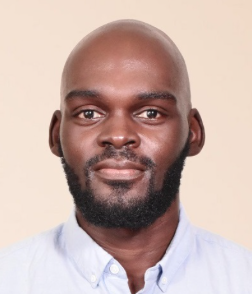Black Intern Builds A Career Tackling Rare Diseases
Using the power of AI and machine learning to help doctors identify difficult to diagnose illnesses and assure the best treatment.
Myron Odingo spotted the power of health data and AI to identify people living with rare diseases while studying pharmacoepidemiology. In 2021 he took part in the HDR UK Black Internships Programme, which gave him the computer skills needed to take his career in the direction he wanted. And he was so impressed with the programme that he joined the advisory board. We asked him about the programme and his career.
Tell us about your studies before going into health data science.
 I’m originally from Kenya and came to Keele University to study pharmacy. I then stayed at Keele for a PhD in Pharmacoepidemiology. That’s what introduced me to the world of health data.
I’m originally from Kenya and came to Keele University to study pharmacy. I then stayed at Keele for a PhD in Pharmacoepidemiology. That’s what introduced me to the world of health data.
What appealed to you about health data science techniques?
I always had an interest in predictive modelling. So even at master’s level I did some predictive modelling but mostly using more conventional tools. But when I was doing my PhD, I realised how we could help people using health data.
My first project looked at the feasibility of finding patients with a rare disease called familial hypercholesterolemia who were not receiving optimum treatment. Diseases like this are very difficult for doctors to diagnose as the symptoms can be very subtle and we must combine a lot of clinical factors to identify a patient.
However, AI and machine learning can bring together all those small details, and flag potential cases up to say, “please have a look at this patient for this disease”.
That’s when I began to engross myself in health data science, writing computer code, to help identify patients with rare diseases or identify patients who were not adequately managed.
And after your PhD?
I got a post doctorate research fellow job at the University of Nottingham. I really wanted to grow and establish myself as a data scientist in rare disease and machine learning. That’s when I applied for the internship.
So how was that?
My host organisation was the Digital Research Service at the University of Nottingham which was very convenient. It was great because they were very flexible with my project. I managed to work across two teams at the University and meet different people doing very different things in health data.
What happened afterwards?
I decided to join the advisory board for the Black Internship Programme. There were things I thought could be made even better.
People join this internship for different reasons, some just want to find out about health data science and don’t have experience. Then there are some who have a little bit of experience and want to grow. Then there are a few who are quite established and want to do some networking and get introduced to people in the field.
I wanted to find ways to make sure we fully catered for everyone. And I really wanted to champion for more resources for the people who were completely new to health data science. This group would have questions like, “Where do I start? Where do I learn this”? So, we incorporated that and included basic Python, R training for them.
Did the internship benefit you?
Very much so. It added relevant skills to my CV and allowed me to learn different tools which was extremely useful.
My background in pharmacy and pharmacoepidemiology was very clinical and health research focused. I needed more of the computer programming element. And that’s what the internship allowed me to do. It allowed me to have this new set of experiences, and people could look at me and say, “hey, you’ve actually worked in a team, using Agile methods to solve a problem”, you know, in that kind of way.
It also boosted my confidence a lot. When you are part of the internship, you get to interact with everyone. It is a very friendly team at HDR UK. Especially working as an advisor, I got access to the leaders of the programme, I was part of the discussions and decision making, and organising the programme.
And what are you doing now?
The skills I developed allowed me to get the job as a Project Manager for Sanofi in Reading. I’ve been able to incorporate my PhD, my pharmacy background, and the health data science work that I did in the internship, and at the University of Nottingham. And what I do now is help develop and implement AI algorithms that can flag people suspected of having rare diseases across the country. This ensures that they are tested in a timely manner and receive appropriate care.
I am forever grateful to everyone I have met and worked with through this journey, looking forward to the future!
